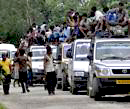
Kokrajhar (Assam), July 25: Fresh clashes between minority immigrants and Bodo tribals and cases of arson were today reported from lower Assam even as shoot-at-sight orders remained in force in Kokrajhar district which bore the brunt of the violence.
Official sources said there were reports of stray clashes and arson in remote villages of Chirang district where night curfew continued. Night curfew is also on in neighbouring Dhubri district.
Assam remained cut off from the rest of the country by rail as train services remained suspended all over the state with hundreds of Assam-bound passengers being stranded in Coochbehar in West Bengal on the border with Assam and other places.
There were reports of food and drinking water shortage among the passengers leading to protests by them.
The official death toll stood at 32, but Chirang Deputy Commissioner Upendra Nath Bora said there were unconfirmed reports of recovery of three more bodies.
Over one lakh people have been rendered homeless and 125 relief camps have been set up in the affected district of Kokrajhar, Chirang and Dhubri.
Sources said that 18 columns of the Army's 21 mountain division were on their way to the troubled districts.
An all-party delegation of the Assam Assembly are scheduled to visit the troubled areas today.
Earlier:
Assam riots toll rises to 32; more than 70,000 flee homes

Chirang(Kokrajhar), July 25:(TNN) With four rioters who defied curfew orders killed in police firing on Tuesday and nine more bodies recovered, the death toll in the five-day-old Bodo-Muslim violence in lower Assam districts rose to 32. Shoot-at-sight orders remained in effect for the second day in Lower Assam, and Kokrajhar town, an important trade hub, looked deserted. The situation was no different in Chirang's district headquarter, Kajalgaon.
Since Friday, when the orgy of violence began, more than 70,000 people have fled their homes, with at least 60 villages belonging to both Bodos and Muslims in Kokrajhar and Chirang districts reduced to cinders. The spiraling violence led to the cancellation of 11 trains that left around 20,000 passengers stranded in different places in the state.
In relief camps, overcast skies, billowing smoke, and pale faces of hundreds of people huddled in groups spoke of the scale of the human tragedy, inviting comparisons with the last time such killings had occurred, in 2008, when 60 people were butchered and more than one lakh displaced in the violence between rogue elements among Bodos and Muslims. Late Tuesday, inspector-general of police S N Singh confirmed 32 dead but other sources warned the toll could be higher and many wounded by either sickle or knife attacks or bullets could die in hospitals.
Noor Jamal Mundul speaking to TOI from Amguri Higher Secondary School in Chirang district made a desperate plea for help. "More than 3,000 of us have taken refuge in a school. The Bodos have surrounded us from all sides. The Assam police are outnumbered and the Army and the SSB are not helping," said Mundul on phone.
Shahadat Ali (35) of Besorbari village in Chirang lost everything in the violence. It was a cloudy evening, when Shahadat, an auto-rickshaw driver, was preparing for Iftar with his family on Monday when a horde of violence-mongers gutted his house.
"I could save nothing. We rushed to relief camps with empty hands," Shahadat said, his eyes blank. At least eight villages in Chirang, mostly belonging to Muslims, were gutted by Bodo miscreants on Monday. The arson continued until Tuesday, with more Muslim villages being attacked.
Tales of suffering are no less poignant from members of the Bodo community. Durga Basumatary of Malgaon in Kokrajhar ran for safety leaving behind her home and property, all of which is now gutted. She has no one to turn to for help and is disconnected with her family. Her village, Malgaon in Kokrajhar, was set afire by miscreants on Tuesday morning. About 50 houses were destroyed. Durga gasps for breath as she explains what she went through.
"We ran for our lives when our village was set ablaze. I didn't know where I was going when I left my village. My husband went in another direction," Durga wept.
Like Shahadat, Muslims among the sufferers are sad about the rude interruption of Ramzan. And like them, the Bodos no longer see any joy in their upcoming post-harvest Nangalkrah celebration with their rice cultivation season ruined by the turmoil.
In Kokrajhar, more than 25 villages belonging to both Bodos and Muslims have been burnt down since Monday night. Tensions ran high in Sishubari of Chirang district till on Tuesday when miscreants armed with firearms and sharp weapons reached the banks of Huthoti river, which divides the Bodo and Muslim villages. A face-off was averted after both sides assured that they won't enter each other's villages.
"Both sides agreed not to enter cross the river. We are relieved after our discussions," said All Bodoland Minority Students Union (ABMSU) leader, Shahjahan Ali Ahmed.
While Sishubari is little relieved for the time being, other villages across Chirang and Kokrajhar live in fear. Outsiders are chased out and even journalists have been prevented from entering some villages.
Amid fear of attacks, people continued to rush to 116 relief camps in Chirang and Kokrajhar district on Tuesday. People also rushed out of Bodoland Territorial Council for safety. About 600 Bodos have taken shelter in Kajalgaon relief camps, while over 5,000 Muslims have left their villages in Chirang district.
As the violence continued, saner voices appealed for peace. "We've had enough bloodshed. We want peace among different communities," said Sopra Mushahary of Kokrajhar. ABMSU Chirang district president, Shah Kamal Khondekar, said, "We want an end to this violence as it helps no one."





Comments
Add new comment